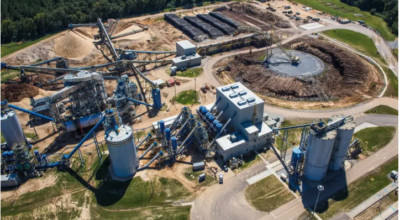Residents voice opinions on hydro plant royalties
Published 12:00 am Wednesday, June 3, 2015

People gather at Vidalia City Hall for a public hearing. Those gathered were curious as to where funds have been allocated from the revenue gained from the hydroelectric plant in the past ten years. Many residents were in favor of rebates on their utility bills. (Sam Gause / The Natchez Democrat)
VIDALIA — During a public hearing that was sometimes punctuated by jeers and hecklers, Vidalia officials made their case Tuesday evening for the Square on Carter project, discussed the use of hydroelectric plant royalties and promised residents a rebate — next year.

Vidalia resident Patricia Lane reads grievances that she has with the city during a public hearing at Vidalia City Hall. (Sam Gause / The Natchez Democrat)
The first of two public hearings scheduled after the Louisiana Bond Commission told the city to have hearings in order to make sure the city is in compliance with the ordinance that dictates how royalties generated by Vidalia’s participation in the Sidney A. Murray Hydroelectric Station was Tuesday.
The second is scheduled for 6 p.m. June 9.
During the standing-room only hearing, residents grilled city officials about how the funds have been used in the past and put the individual members of the board of aldermen on the spot, asking if they were aware of the ordinance — No. 588 — and if the aldermen thought the city was in compliance with it.
“I will assure you this administration has followed that ordinance exactly as it should,” Mayor Hyram Copeland said. “The auditors have cleared it. The attorneys have cleared it.”
One of the stipulations in the ordinance says that if the town wants to spend excess hydroelectric revenue, it has to publish a schedule of proposed projects for the money and have two public hearings to receive public input.

Melvin Maples expresses his grievances towards the price of power in Vidalia to Vidalia’s mayor Hyram Copeland during a public hearing at Vidalia City Hall Tuesday. (Sam Gause / The Natchez Democrat)
City Accountant Ashley Anderson said the hydroelectric funds were included in the city’s budget each year — including payments — and city officials believed those hearings met the requirements of the ordinance.
“In the audited financials, if they didn’t feel it was in compliance with the ordinance, it would have been written up,” Anderson said.
When a member of the audience asked the board members to speak about their knowledge of the ordinance and how it had been handled, Alderman Jon Betts said he knew about the ordinance and had asked about it.
“I have had concerns about it,” Betts said.
When a member of the audience asked Betts if he thought hydroelectric funds had been spent without following the ordinance, Betts replied, “Yes, sir.”
Aldermen Tron McCoy and Mo Saunders said to their knowledge they had never broken the law, and Alderman Vernon Stevens said he had “never willingly violated the ordinance.”

Laurence Leyens speaks about the City of Vidalia’s plans for The Square on Carter during a public hearing. (Sam Gause / The Natchez Democrat)
“You have to have the hearings if you have a surplus,” Stevens said. “We haven’t had a surplus the last two years the way I interpret the payments are made into the fund.”
Before the city can consider rebating some of the funds to utility customers, the ordinance requires:
-Paying city obligations for participation in the hydroelectric plant
-Paying previous debt incurred using surplus revenues
-Making transfers into a Reserve Fund
-Making transfers into the Town of Vidalia Utility Fund every month the municipality’s normal cost of electric power exceeds 38 mills per kilowatt-hour.
When those four obligations are made, the city can discuss rebating up to 50 percent of the remaining revenue to utility customers.
Alderman Ricky Knapp said he asked annually about possible rebates during the city’s budget meetings.
“I was not aware of any excess revenue, therefore I never thought we were non-compliant,” he said.
Copeland told those in attendance the city started implementing software in January that will allow the city to see if it has surplus funds for a rebate, a decision he said had nothing to do with the meeting Tuesday.
Members of the Murray family — Sidney Murray is the former mayor who conceived of the plant and whose name it bears — called for greater transparency of how funds will be used and have been previously used.
“We are only here today because the mayor and board were finally forced to this point,” Patricia Murray Lane said. “For the past 15 years the portion of the ordinance requiring public hearings has been pushed aside, denied and violated.
“To begin following the ordinance now is necessary but not enough.
“Many millions of dollars have been received and spent without any accounting to the people. I believe most of the citizens would like to see some return on the investment on the hydro plant. The idea of rebating was not put into the ordinance to be ignored.”
Copeland said the only hydroelectric funds being spent in connection with city bonds currently are those for the new municipal complex.
Some residents questioned why Vidalia is paying more per kilowatt hour for electricity, while Corinne Randazzo — the wife of the late former mayor, Sam Randazzo — asked if hydroelectric funds were being used to keep the city’s convention center in the black.
Resident Bill McDonough asked why the city doesn’t use the current excess revenue to pay off its existing debt before taking on new projects.
“Put it on our note, then you talk about having money,” he said. “The trick is to get out of debt.”
Resident Donna Jones said she has for many years stood with the Murray family on the matter of the royalties, but she also recognizes that funds have been used for good things around the city.
“No money has been squandered and we have a lot to show for it,” she said. “But I think a lot of people want to put their foot down until we get some money in our pockets.”
During the meeting the board also discussed the Square on Carter proposal, the proposed $7 million project to purchase land and lay infrastructure near the western end of town in order to lure private developers to the area to build a residential, commercial and recreational town center.
Anderson said the project would be paid for by several new revenue streams including the sale of property, increases in sales and ad valorem taxes, and separate sales, ad valorem and hotel occupancy taxes for the area in question.
Even without those revenue streams, the city can pay for the project using its ad valorem taxes, sanitation fees, sales taxes, utility fees, the wholesale of electricity and hydroelectric royalties.
Concordia Parish Economic Development Director Heather Malone outlined to the crowd how the proposal was developed as part of a larger master plan for the city by consultants working with a committee of local residents.
Malone said she wanted to make it clear to those present the city is not planning to build the buildings associated with the project and the proposal is still in the due diligence stage.
“I still feel like we are premature in the process on this project (with this hearing) because we have not asked the board to put it in their budget yet,” she said “We just asked the board to go to the bond commission to see if the town was financially feasible as a whole — not just hydro money — to fund this project.
Consultant Laurence Leyens said he believes the government “can provide leadership” in initiating change and development in a community. When members of the audience asked why the Vidalia riverfront wasn’t considered for a town center, Leyens said it wasn’t available for commercial development, to which an audience member yelled back, “That’s all that’s on it.”
Leyens’ presentation of the project was interrupted a number of times by audience members who loudly questioned its viability, and when he said the government could lead in the development because a large developer had worked for nearly a year but couldn’t get a whole project to move forward, a woman in the audience asked him why the city should take on the risk.
Leyens said the city has nine letters of interest from the private sector about the project. The developers only want a portion of the bigger project, he said.
“They want to be a part of it if this is going forward,” he said. “I have not been able to get anybody willing to spend the amount of money needed for (all) this.”
The difference between the city participating in the project and a large developer is the city only needs to break even, while developers would need to make a 12 to 15 percent profit, he said.
“I was hoping to have in hand contracts before I asked the board to buy the land,” he said.
At the end of the hearing, Copeland said city officials wished as many citizens would turn up for meetings regularly, saying they “begged” for resident participation.
The next meeting will also be at City Hall.





